KEYNOTES
Track 1. Atmospheric Sciences, Meteorology, Climatology, Oceanography
Track 2. Biogeochemistry, Geobiology, Geoecology, Geoagronomy
Track 3. Earthquake Seismology and Geodesy
-
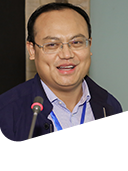
Longjun Dong
Chief Editor – Track 3 of AJGS
School of Resources and Safety Engineering
Central South University, ChinaLongjun Dong received his Ph.D. degree from the School of Resources and Safety Engineering, Central South University in Changsha, China. From 2012 to 2013, he was an Assistant Researcher at the Australia Center for Geomechanics of The University of Western Australia, Perth, Australia. He is currently a Professor with the School of Resources and Safety Engineering at Central South University. He has authored more than 100 papers published in conference proceedings and journals. He holds 30 patents. His current research interests include engineering seismicity, applied geophysics, engineering acoustics, rock/mineral mechanics, and non-destructive evaluation. He manages a project supported by the National Science Foundation for Excellent Young Scholars of China in 2018. He is a senior member of IEEE, and a member of ASCE and ISRM. He was selected for the Young Elite Scientists Sponsorship Program by the China Association for Science and Technology. He has served as a Reviewer of more than 30 journals. In 2020, he was invited to serve as the Chief Editor – Section 3 of the Arabian Journal of Geosciences, and as Editorial Board Member / Associate Editor of Safety Science, JASA-EL, Scientific Reports, Journal Safety in Extreme Environments, and Shock and Vibration. In his keynote at the 3rd CAJG, Professor Dong will talk about how to locate and control the seismic sources of induced earthquakes in rock engineering.
Track 4. Environmental Earth Sciences
-
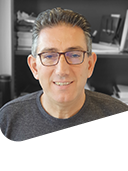
Gassan Hodaifa
Guest of Editorial Board of AJGS
Professor at Pablo de Olavide University, Seville, Spain
Permanent Member of Centre for Advanced Studies in Olive Groves and Olive Oils, Jaén, SpainGassan Hodaifa is Food Engineer (University of Albaath, Syria), Chemical Engineer (University of Granada, Sapain) and PhD holder from the University of Jaén, Spain in the Doctoral Program of “Biotechnology and Agri-Food Engineering”. He has been an Assistant Professor and Associate Professor at the University of Jaén (2005/06) and the Complutense University of Madrid, Spain (2006/09). Currently, he works as Professor at the Pablo de Olavide University in Seville, Spain. He is a member of the research group "Bioprocesses TEP-138 (Junta de Andalucía)" and works in the research lines of Microalgae, Treatment of Wastewaters, Chemical Oxidation, Membrane Technology, Adsorption, Pesticide Removal, Olive Oil Processing and Enzyme Biotechnology. He developed a new technology for olive mill wastewater treatment. Currently, he is involved in the development of a new line of research about nematode biomass production in bioreactors for use in aquaculture and in the production of biofuels. He has participated in 24 research projects (European, national and commercial). He has designed, installed and automated an industrial pilot plant for wastewater treatment of oil mills (3-5 m3/h). He is the co-founder of the Start off “CEPATM Nematode Production for Aquaculture, S.L.”. As a result of his research work, 47 articles have been published in JCR, 25 of them belong to Q1, 15 Q2 and 7 in Q3, 2 patents for water purification of olive oil mill wastewater, 3 books, and 27 book chapters in prestigious publishers such as Academic Press (Elsevier), CRC Press, Taylor and Francis Group, Springer International Publishing AG etc. He has managed a number of Special Issues in Journal of Chemistry and Catalysts Journal as editor. He has participated in 105 Congresses and Conferences, 90 of them international. He has been active as a reviewer for more than 60 JCR journals such as App. Energy, J. Clenear Prod. etc. and he is a member of the Editorial Board of 4 international journals. In his keynote speech at the 3rd CAJG, Professor Hodaifa will talk about the application of microalgae cultures to wastewater treatment.
Track 5. Exploration & Theoretical Geophysics, Seismic & Well Logging Methods, Mathematical Geosciences
-
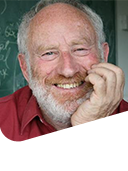
Herbert E. Huppert FRS
Guest of Editorial Board of AJGS
Editor of the Proceedings of the Royal Society A
Co-Editor-in-Chief of G4: Geomechanics and Geophysics for Geo-Energy and Geo-Resources (Springer)
Institute of Theoretical Geophysics
King’s College, University of Cambridge, UKProfessor Herbert Huppert FRS is Emeritus Professor of Theoretical Geophysics in the University of Cambridge, UK. His theoretical and laboratory-based work has improved our understanding of the behavior of fluids in and on the Earth’s surface, and his work on convective systems has been crucial for an improved comprehension of our planet’s response to a changing climate. Often in demand as a scientific authority, Herbert served as Chair of a Royal Society working group on bioterrorism, which prepared a report for the British Government, a European Academies working group on Carbon Capture and Storage, which prepared a report for the European Parliament and has acted as an adviser to numerous other government bodies. He has received several of awards for his work, including the Bakerian Lectureship of the Royal Society, a Leverhulme Emeritus Fellowship and The Australian Academy’s Selby Public Lectureship 2019. In his keynote at the 3rd CAJG Professor Huppert will explain how viscous flows over variable topography, deflected by walls can be analyzed and how the results can be applied to understanding the motion of lava flows with the aim of constructing walls and buildings that minimize the damage caused.
Track 6. Geo-Informatics and Remote Sensing
-

Hesham El-Askary
Associate Editor of AJGSProfessor of Remote Sensing and Earth Systems Science
Director Computational & Data Sciences Graduate Programs
Center of Excellence in Earth Systems Modeling & Observations
Schmid College of Science and Technology, Chapman University, USAProfessor El-Askary received his Ph.D. in Computational Sciences and Informatics from George Mason University in 2004. He is the 2015 recipient of the Chapman University's elite Senior Wang-Fradkin Professorship award. He served as the regional coordinator on a $3 million Euro grant from the European Union’s (EU) Horizon 2020. He is an Earth System Scientist with a major interest in studying natural hazards using different remote sensing technologies and data sciences. He is involved in studying extreme events, air pollution problems over mega cities, climate change and its impacts on sea level rise and coral reefs for coastal areas. He also employs earth observations in studying impact of sever dust storms causing anomalous chlorophyll outbreaks in the marine environment, hurricanes intensification as well as transport of microbes’ causing Kawasaki disease outbreaks. He has published over a 100 refereed research publications, conferences full paper and book chapters in these research areas.
Track 7. Geochemistry, Mineralogy, Petrology, Volcanology
-

Astrid Holzheid
Guest of Editorial Board of AJGSUniversity of Kiel, Kiel, GermanyProfessor Astrid Holzheid studied Geology and Mineralogy at University of Mainz in Germany, Edinburgh University in Scotland and Max-Planck-Institute of Chemistry in Mainz. She received her PhD from the University of Cologne, Germany, and completed postdocs at MIT, USA and the University of Münster, Germany. Since November 2006, she has been a full professor at Kiel University in Germany and, since 2020, honorary professor at Washington University in St. Louis, USA. She applies experimental and theoretical petrology and geochemistry to mineralogical questions in planetary processes in the early solar system and during formation and evolution of terrestrial planets. In her keynote speech at the 3rd CAJG, Professor Holzheid will talk about Platinum Group Elements and their various applications to shed light on early Earth processes, mantle evolution as well as crustal differentiation.
Track 8. Geological Engineering, Geotechnical Engineering
Track 9. Geomorphology, Geography, Soil Science, Glaciology, Geoarchaeology, Geoheritage
-

Jamie Woodward
Guest of the Editorial Board of AJGS
University of Manchester, UKJamie Woodward is Professor of Physical Geography at The University of Manchester where he was Head of the Department of Geography from 2016–2019. His PhD research on Quaternary river behavior and karst sedimentation in NW Greece was undertaken at the University of Cambridge. He is a Fellow of the British Society for Geomorphology and was editor of Geoarchaeology: An International Journal for 12 years (2007-2019). He has worked in the Mediterranean region for over three decades and in the Nile Valley since 1995. In 2009, he edited The Physical Geography of the Mediterranean for Oxford University Press. He is interested in Quaternary landscape change and how humans interact with rivers over a range of timescales. His recent work in the UK has shed light on the problem of microplastic contamination in river catchments. Jamie was a Trustee of the Royal Geographical Society from 2017 to 2020. In his keynote at the 3rd CAJG, Professor Woodward will talk about the Holocene history of the River Nile with a focus on the fluvial geomorphology and geoarchaeology of the Nile desert in Sudan and Egypt as long-term records of global climate change.
Track 10. Hydrology, Hydrogeology, Hydrochemistry
-
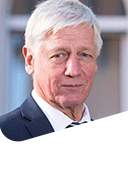
Broder Merkel
Chief Editor – Track 10 of AJGS
Associate Editor of Environmental Earth Science (Springer)
Publisher of Freiberg Online Geoscience (FOG)
Institute of Geology, Technische Universität Bergakademie Freiberg, GermanyProfessor Broder Merkel is emeritus Professor of Hydrogeology and Hydrochemistry in the Technische Universität Bergakademie Freiberg (TUBAF), Germany. His work in TUBAF since 1993 focused on the theoretical and practical education of students (Bachelor, Master and PhD from several study programs). He was one of the first professors at TUBAF to develop e-learning tools as a teaching option. His research topics are the development of sampling tools and field sensors, utilization of natural isotopes, speciation techniques in the lab, and geochemical modeling including reactive transport modeling by combining numerical transport codes for various saturated media (fractured and porous) with the geochemical code PHREEQC. Mining environments (e.g. uranium mining) and clean-up of contaminated sites, deep geothermal reservoirs and impact of CO2 at high p/T conditions are topics of special interest for him. He served as Dean of the Faculty of Geoscience, Geo-engineering and Mining and as Vice Rector of the university. In his keynote at the 3rd CAJG, Professor Merkel will talk about dos and don'ts of field and laboratory work in hydrogeology and hydrochemistry and the use of simple and advanced statistics such as deep learning and numerical models to understand complex systems including the development of prognoses for stakeholders and decision makers.
Track 11. Marine Geosciences, Historical Geology, Paleoceanography, Paleoclimatology
-

Madelaine Böhme
Guest of the Editorial Board of AJGS
Vice-President of RCMNS (Regional Committee for Mediterranean Neogene Stratigraphy)
Professor at Eberhard-Karls University, Tübingen, GermanyProfessor Madelaine Böhme studied Geology and Palaeontology at Bergakademie Freiberg (Germany), did her PhD at Leipzig University (Germany) and worked as postdoc at Ludwig-Maxillians-University in Munich (Germany). She was the founding director of the Senckenberg Center for Human Evolution and Palaeoenvironment at Tübingen. As a geologist and palaeontologist, she is interested in terrestrial ecological systems and palaeo-climate with special research focus on human evolution. In recent years their research emphasis is concentrated on the evolution of arid lands along the Old World Desert Belt during the Neogene. Thereby she uses a broad array of geochemical, geophysical and sedimentological methods, which include essentially a field-oriented and organism based (vertebrates and plants as proxies) approach to understand our past. In her keynote at the 3rd CAJG, Professor Böhme will talk about the Neogene climatic evolution of northern Arabia (Mesopotamian Basin).
Track 12. Numerical and Analytical Methods in Mining Sciences and Geomechanics
-

Ali Karrech
Associate Editor of AJGS
Department of Civil, Environmental, and Mining Engineering
School of Engineering, Faculty of Engineering and Mathematical Sciences
The University of Western Australia, Crawley, AustraliaAssoc. Professor Ali Karrech is specialist in Engineering Sciences with interest in material sciences, numerical methods and resource engineering. He finalized his B.Sc. in Engineering at the Tunisia Polytechnic School (Tunis, Tunisia, 2001). Afterward, he obtained a M.Sc. degree in Mechanics of Solids, Materials and Structures (2004) and a PhD degree in Materials and Structures (2008) from the Ecole Nationale des Ponts et Chaussées (Paris, France), and he received his Higher Doctorate (Habilitation à Diriger des Recherches) in Engineering Sciences from the Ecole Normale Supérieure Paris-Saclay (Paris, France, 2013). Prior to his appointment as Associate Professor at The University of Western Australia UWA, he was a Senior Research Scientist at the Commonwealth Scientific and Industrial Research Organisation (CSIRO) until July 2012. He had also held the position of Assistant professor at the Petroleum Institute of Abu Dhabi (2007–2009). He received several research awards especially from the Australian Research Council and The Research Council of Oman. Apart from conference contributions, he authored more than 100 peer reviewed journal papers in indexed journals. He is currently a member of Engineers Australia (MIEAust) and a member of the Australian Institute of Mining and Metallurgy (MAusIMM). In 2017 Assoc. Prof Karrech joined the Arabian Journal of Geosciences (Springer) as an Associate Editor responsible for evaluating submissions in the fields of Civil, Environmental and Mining Engineering with particular focus on computational geo-mechanics for resource engineering applications. In his keynote at the 3rd CAJG Assoc. Professor Karrech will talk about the “environmentally benign recovery of precious metals using in-situ leaching – an alternative to conventional highly mechanised mining methods.”
Track 13. Petroleum and Energy Engineering, Petroleum Geochemistry
-

Haytham El Atfy
Guest of Editorial Board of AJGS
DAAD PhD and Alexander-von-Humboldt-Stiftung Postdoctoral Fellow
Mansoura University, EgyptDr Haytham El Atfy is a petroleum palynologist specializing in palynology and organic geochemistry with more than 10 years of academic and industrial experience covering both conventional and unconventional resources. He is currently associate professor at Mansoura University, Egypt, from which he has received a BSc in geology and an MSc in palynology. He has obtained his PhD in geosciences (palynology and organic geochemistry) from the Goethe University of Frankfurt, Germany, in 2014. Recently, he has received a Research Fellowship from the Alexander von Humboldt Foundation to conduct research at the Institute of Geosciences at Eberhard-Karls University of Tübingen in Germany. He is also a visiting researcher at the Senckenberg Research Institute and Natural History Museum in Frankfurt, Germany and UNIVATES, Brazil. His research interests span all aspects of palynology and its applications in hydrocarbon exploration, age dating and paleoenvironmental and paleoclimatic reconstructions, particularly of the Mesozoic and Cenozoic and, to a lesser extent, the Paleozoic. He has more recently become involved in organic geochemistry, mainly vitrinite reflectance and organic petrography and TOC and Rock-Eval pyrolysis. His expertise covers many basins in the MENA region and beyond, for example; north Western Desert, Nile Delta and Gulf of Suez basins in Egypt; Sirte Basin in Libya; southern Iraq; Jordan; France, Germany, North Sea and Brazil. Throughout his career, Dr El Atfy has received several awards such as the Egyptian State Incentive Award, the Bernd Rendel-Prize from the German Science Foundation (DFG), the TMS-Alan Higgins Award for Applied Micropalaeontology and many others. In his keynote at the 3rd CAJG, Dr El Atfy will talk about palynology and its applications for hydrocarbon exploration to determine petroleum source potential from the quantity, quality and maturation of organic matter, paleoenvironmental and paleoclimatic reconstructions and biostratigraphy within different basins in MENA region.
Track 14. Sedimentology, Stratigraphy, Paleontology, Geochronology
-

Luc Bulot
Associate Editor of AJGS
North Africa Research Group
The University of Manchester, UK
Luc Georges Bulot is a Senior Research Fellow (CNRS) at Aix-Marseille University (France) since 1998 and a Research Fellow at the University of Manchester since 2017. He graduated from Dijon University, France, with an MSc in 1990, and from the National Museum of Natural History in Paris, with a Ph.D. in 1995. His career started as a Consultant for Lagoven SA in Venezuela, and then as an Assistant Lecturer at Grenoble University, France. Since 1995, he has acted as chairperson and/or regional coordinator for Lower Cretaceous Working Groups of the International Subcommission of Cretaceous Stratigraphy (ISCS/IUGS). His current research interest covers the Middle Jurassic to Late Cretaceous of the Middle East, Northern Africa, and South America. He currently leads the Biostratigraphy team of the North Africa Research group and co-leads with Daniel Aslanian and Marina Robineau (LCO/Ifremer/CNRS, Brest, France) a project on Ammonite palaeobiogeography vs. plate kinematics and sedimentary flux. His publications record includes over 100 papers on Jurassic and Cretaceous ammonite taxonomy, biostratigraphy and paleoecology, as well as many contributions on high resolution integrated stratigraphy. Luc is also an Associate Editor of the Arabian Journal of Geosciences (AJGS). In his keynote speech at the 3rd CAJG, Luc will talk about the myths and reality of the Hispanic Corridor as a migration route during the opening of the Proto-Atlantic.
Track 15. Structural Geology, Tectonics and Geodynamics, Petroleum Geology
-
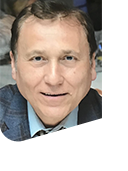
Yildirim Dilek
Associate Editor of AJGSUniversity Distinguished ProfessorMiami University, Oxford, OH, USADr Yildirim Dilek is a University Distinguished Professor at Miami University (USA), where he teaches Structural Geology, Global Tectonics, and Oceanography. He received his PhD from the University of California (USA) and did his postdoctoral studies at the Getty Research Institute (Los Angeles, CA) as a China Fellow working in the Mogao Caves in Dunhuang. He has been a visiting professor at the University of Tsukuba, Kanazawa University, and Tohoku University-Sendai (Japan), University of Bergen (Norway), Ecole Normal Superieur-Paris (France), China University of Geosciences-Beijing (China), Zhejiang University in Hangzhou (China), and Guangzhou Institute of Geochemistry in Guangzhou (China). He investigates the structure, petrology and geochemistry of modern and ancient oceanic lithosphere through deep drilling and submersible diving projects at sea, and through interdisciplinary studies of ophiolites and accretionary prisms on-land. He has worked extensively in different orogenic belts in the Western USA Cordillera, the Western Alps in Italy, the Albanides-Hellenides-Taurides-Anatolides in Albania, Greece and Turkey, the Western Caledonides in Norway, and the Tibetan Plateau and Inner Mongolia in China. Professor Dilek has published over 300 papers and has edited 25 books. In his keynote at the 3rd CAJG, Professor Dilek will talk about Mesozoic Evolution of Tethyan Oceanic Lithosphere and Suture Zones in Peri–Gondwana Seaways.


